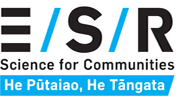The SHIVERS (Southern Hemisphere Influenza and Vaccine Effectiveness Research and Surveillance) project, ESR as the lead agency and Dr Sue Huang as Principal Investigator, resulted from a successful NZ$9M application (evaluation of influenza and other respiratory diseases in the Southern Hemisphere) to the US Department of Health and Human Services through the Centers for Disease Control and Prevention (CDC) in 2011 for a funding period of 6 years.
During 2012-2017, this multi-agency and multi-disciplinary collaboration assembled a world-class team of public health experts, laboratory scientists, clinicians and academics and established a novel and modern prospective, population-based surveillance for acute respiratory illness in hospitals and community in New Zealand.
SHIVERS has contributed new insights into the burden of influenza, vaccine effectiveness, influenza immunology, Respiratory Syncytial Virus, and other respiratory viruses, especially among children and older adults. The study has resulted in over 17 peer-reviewed publications
The Ministry of Business, Innovation and Employment selected the programme as one of the five case studies of science impact in New Zealand in 2016 in terms of its beneficial changes in economic, health, social or cultural outcomes. SHIVERS also received awards from CDC, the Charles C. Shepard Science Awards for excellence in science and Larry J. Anderson Award for Outstanding Public Health Science. In November 2018, SHIVERS won a national Team Award from Science New Zealand as a Crown Research Institute awards.
In addition, the SHIVERS platform has continued to attract significant national and international funding after 2017:
1) US-National Institute of Allergy and Infectious Diseases during 2017-2020 on influenza (SHIVERS-II);
2) GlaxoSmithKline (EURO1M) during 2017-2019 on hospital-based study on respiratory syncytial virus (SHIVERS-RSV)
3) Ministry of Health (NZ).
Team members: Sue Huang, Claire Newbern, Lauren Jelly, Judy Bocacao, Jacqui Ralston, Wendy Gunn, Tim Wood, Ben Waite, Liza Lopez, Thomas Metz, Namrata Prasad, Nayyereh Aminisani, Pam Kawakami, Robyn Madge, Susan Walker, Amanda des Barres, Robert Press, Sarah Henry, Christina Bir.
(Including ex-ESR staff: Ruth Seeds, Don Bandaranayake, Graham Mackereth, Sarah Radke, Ange Bissielo, Anne McNicholas, Jenni Haubrock, Tiffany Walker, Angela Todd, Sally Roberts, Debbie Williamson)

Members of the team with the Hon Dr Megan Woods at the Science New Zealand Award dinner: Wendy, Lauren, Sue, Tim, Ben, Robert Press, Jacqui, Christina and Judy (l to r)
New Zealand is an ideal location to study influenza and other respiratory viruses because:
- New Zealand has very comprehensive and up-to-date electronic medical records.
- ESR has good and productive relationships with other collaborating organisations that allow for study development, implementation, and approval.
- New Zealand's influenza season often predicts what will happen in the northern hemisphere.
The ESR-led Southern Hemisphere Influenza and Vaccine Effectiveness Research and Surveillance (SHIVERS) study, based in the greater Auckland area from 2012-2017, was the largest and most comprehensive influenza research initiative conducted in the Southern Hemisphere at the time. SHIVERS was a multi-agency, multi-disciplinary collaboration aiming to better understand influenza and other respiratory viruses and related illness in the hope of curbing future outbreaks and pandemics. Learn more about this SHIVERS 2012-2016 study.
